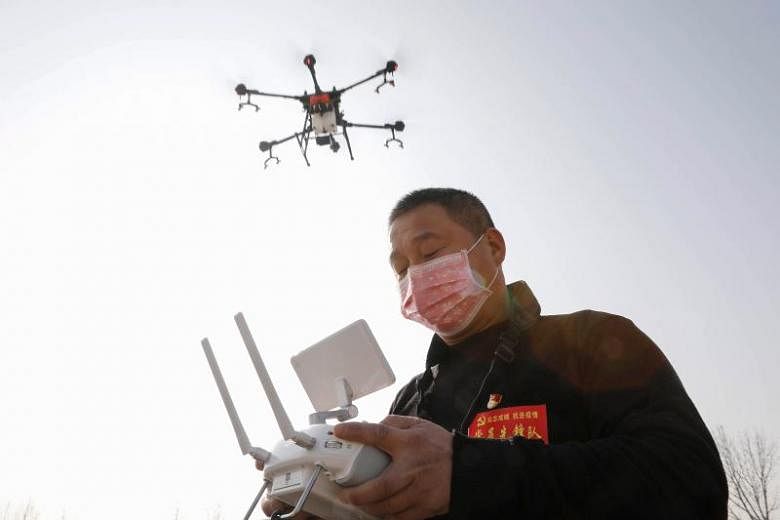BEIJING/HONG KONG - From deploying drones to chide citizens for not donning masks in public to using robot assistants to deliver medical goods and conduct disinfection operations, China is employing a tech-savvy approach to tackle the country's coronavirus outbreak.
In the north-western region of Ningxia, a drone hovers above the street in a district in Yinchuan city, scanning for citizens roaming around unmasked.
"The gentleman wearing red coat holding a white plastic bag in your right hand - yes, it's you. We found you are not wearing a face mask. Please wear it. If you do not have one, come to the patrol car by the street and get one," the Global Times cited one drone instructing a passer-by.
Drones in the city have also been deployed to spray sanitisers at densely populated residential communities.
Over in Guangzhou, in southern Guangdong province, 5G-powered patrolling robots remind the public of the importance of frequent hand-washing and the mandatory donning of masks. The robots are also equipped with high-resolution cameras and infrared thermometers that are capable of scanning the body temperatures of 10 people at once. A high temperature and the absence of a mask would trigger an alert to the authorities, according to the China News Service website.
Robots have also played a key role in hospitals as part of the nationwide battle against the virus, which is believed to have emerged in the city of Wuhan in Hubei province and has killed more than 1,000 people.
According to a Bloomberg report, telepresence bots equipped with cameras that allow remote video communication, patient health monitoring and the safe delivery of medical goods are growing in number on hospital floors in urban China. These robots have been used as a safe go-between that helps to curb the spread of the virus.
Shanghai-based company Keenon Robotics recently deployed 16 robots of a model nicknamed "Little Peanut" - whose primary function is to make indoor deliveries - to a hospital in Hangzhou as part of a quarantine of a group of travellers from Wuhan.
Meanwhile, telco China Mobile last week also donated one 5G robot each to both Wuhan Union Hospital and Tongji Tianyou Hospital, Bloomberg reported, citing ThePaper.cn. Riding the 5G network, these assistant bots carry a disinfectant tank on board and are being used to safely clean hospital areas along a predetermined route, reducing the risk to medical personnel.
In addition to hospitals in Wuhan, those in Guangzhou, Jiangxi, Chengdu, Beijing, Shanghai and Tianjin are also making use of robot assistants.
DATA TRACKING
China is also using data tracking and artificial intelligence to find and prevent potential infections.
Local authorities in Nanjing in eastern Jiangsu province mined data tracking people who have recently travelled to Wuhan and deployed police to their homes to conduct temperature checks, Agence France-Presse (AFP) reported last Saturday (Feb 8).
Several Chinese tech firms have also developed apps to help people check if they have taken the same flight or train as those taken by confirmed virus patients, scraping data from lists published by state media.
Elsewhere, in Yunnan province, officials have rolled out a measure requiring residents to scan a QR-like code on their phones to enter public places as part of their effort to stop the virus's spread.
The new programme will "allow big data to become the 'piercing eyes' of epidemic prevention and control," the Yunnan government said in a statement on Wednesday (Feb 12).
As they search for potential infections, a point of focus for authorities has been detecting fevers, a common symptom of the Covid-19 disease.
To do that, some public transport hubs are trialling fever detection systems that use artificial intelligence and infrared cameras.
In Beijing, a system developed by Chinese search giant Baidu screens travellers at the Qinghe railway station using infrared and face detection technology, which automatically photographs each person's face.
If someone has a body temperature of 37.3 deg C or above, the system sets off an alarm - prompting a secondary check by station staff.
The National Health Commission has pushed the importance of tapping big data technology and urged local governments to share train, flight, communication, and medical data to identify urgent cases.
"Use big data technology to track, screen priority (cases), and effectively forecast the development of the epidemic in real time," it said in an online statement on Feb 4.











